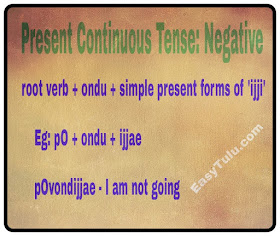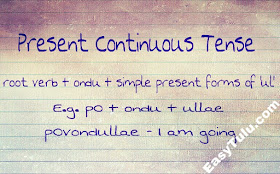namaskAra! Welcome back!
Today we are going to learn something new, i.e.Verbals.
Verbals are forms of verb which is used as another part of speech like nouns,
adjectives or adverbs in a sentence.
Following are the types of Verbals in Tulu:
- Adverbial Participles or Verbal Adverbs (Present, Past Perfect and Negative)
- Adjectival Participles or Verbal Adjectives (Present, Simple Past, Past Perfect and Negative)
- Gerunds (Present, Simple Past, Past Perfect and Negative)
- Verbal Nouns
- Infinitives
Adverbial Participles are mainly used as adverbs. There are three forms;
Present, Past Perfect and Negative.
Present Adverbial Participles: suffix ‘ondu’
Examples:
maltondu – doing (Kannada: mADtA)
pOvondu – going ( Kannada: hOgtA)
ittondu – being (Kannada: iruttA)
tiNondu – eating (Kannada: tinnuttA)
We have already learned this form in Present Continuous
tense. This form is used to express the mode how an action is done.
Tulu: Aye baltondu batte
English: He came running
Kannada: avanu ODtA banda
Tulu: akulu pAterondu bElae maltonduller
English: They are speaking and working.
Kannada: avaru mAtannADtA kelasa mADtiddAre
Tulu: Al teltondu pOyal
English: avaLu nagtA hOdaLu
Kannada: She went smiling
Tulu: sudae paratondu kaDal sEruNDu
English: River flows and joins the sea.
Kannada: nadi haritA samudra sErtade.
Tulu: mange maroDdu maroku lAgyondu pONDu.
English: The monkey went jumping from tree to tree.
Kannada: manga maradinda marakke jigitA hOytu.
Past Adverbial Participles (Perfect):
suffix ‘d’
Examples:
malt’d – having done (Kannada: mADi)
itt’d – having been (Kannada: iddu)
pOdu – having gone (Kannada: hOgi)
tiND’d or tind – having eaten (Kannada: tindu)
Note: “tiND’d” also pronounced as “tind” in common Tulu and
so all verbs ending in ‘N’. E.g. kEND’d
>> kEnd, uND’d >> undu, paND’d >> pand
We have already learned this form in Present Perfect tense. This
form is used to express actions in sequence.
Tulu: Aye uND’d (undu) jette
English: He had lunch/dinner and slept. (Having had
dinner/lunch, he slept)
Kannada: avanu UTa mADi malagida
Tulu: Aye kANdae enma gaNTeg lakk’d, mId, chA pard sAleg
pOye
English: He got up at 8 O’clock, took bath, had tea and went
to school.
Kannda: avanu beLagge eNTu gaNTege eddu, snAna mADi, chaha
kuDidu shAlege hOda
Tulu: yAn AyeDa paND’d (pand) barpae
English: I will tell him and come (Having told him, I will
come)
Kannada: nAnu avanige hELi bartEne
Tulu: enkulu pOdu barpa
English: We will go and come. (Having gone, we will come)
Kannada: nAvu hOgi bartEve
Tulu: Ayena bElae mugit’d illaDe pOye
English: Having finished his work, he went home.
Kannada: avana kelasa mugisi manage hOda
To express the reason or cause of actions:
Tulu: barsa batt’d yAn chaNDi Ayae
English: It rained and so I got wet.
Kannada: maLe bandu odde Ade
Tulu: balt’d balt’d enk bachch’ND
English: I am tired from running
Kannada: ODi ODi nanage sustAytu
Tulu: ninan tUdu enk kushi AND
English: I am happy seeing you
Kannada: ninnanu nODi kushi Aytu
To express time:
Tulu: Aye pOdu onji varsha AND
English: It’s been one year since he went
Kannada: avanu hOgi ondu vasha Aytu.
Tulu: ninan tUdu mast samaya AND
English: It’s been a long time since I saw you
Kannada: ninnannu nODi tumbA samayavAytu
Negative Adverbial Participles: suffix
‘andae’
Examples:
malpu + andae >>> malpandae - having not done (Kannada:
mADade)
pOvandae – having not gone (Kannada: hOgade)
tiNandae – having not eaten (Kannada: tinnade)
uppandae – having not been (Kannada: irade)
ijjandae (or dAntae) – having not been (Kannada: illade)
Generally this form gives the meaning of ‘without’.
Tulu: satya paNandae bEtae sAdi ijji
English: Without telling the truth there is no other way
Kannada: satya hELade bEre dAri illa
Tulu: I dAntae (ijjandae) yAn bad’kayae
Englsih: Without you I can’t live
Kannada: nInu illade nAnu badukenu
Tulu: Aye eNDa paNandae pOye
English: He went without informing (telling) me
Kannda: avanu nanage hELade hOda
Tulu: Aye uNandae jette
English: Without having lunch/dinner, he slept
Kannada: avanu UTa mADade malagida
To express the reason or cause of actions:
Tulu: imbe Odandae parIksheD fail Aye
English: He failed in the exam by not reading
Kannada: ivanu Odade parIksheyalli fail Ada
Tulu: yAn teriyandae tappu maltae
English: I did a mistake unknowingly
Kannada: nAnu tiLiyade tappu mADide
To express time:
Tulu: akulu barandae onji varsha AND
English: It’s been one year since they came
Kannada: avaru barade ondu varsha Aytu
Tulu: ninan tUvande mast samaya AND
English: It’s been a long time since I saw you
Kannada: ninnannu nODade tumbA samayavAytu
Click here to go to Vocabulary page.
Click here for Video lessons
If you need more sentences translated in Tulu, please leave
a comment. If you find this lesson helpful, please share it with your friends
who wish to learn Tulu J
See you next week!
solmelu!




